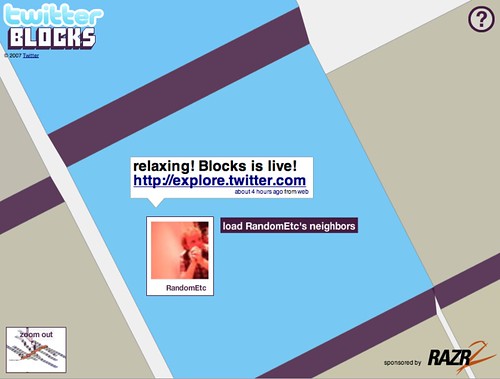
We finally kicked Twitter Blocks out of the door yesterday. It's been in development for about a month, mainly by Ryan Alexander and myself (but all Ryan whilst I was working on Oakland Crimespotting, he's a star). It's the first time we've done 3D things using Flash and it's amazing what's being done with Papervision3D at the moment. On the other hand, having 3D shoe-horned into the 2D Flash engine means the learning curve is a lot steeper than the native-3D Processing/OpenGL worlds Ryan and I are used to.
Whenever Stamen launches a new thing, my immediate reaction is a sigh of relief followed by a slightly obsessive-compulsive trawl of what people are saying about it online. (I use a combination of alerts from Technorati, Google Blog Seach and Bloglines to keep track).
The interesting thing about working with companies like Digg and Twitter is that your work inherits all the criticisms and detractors of those sites as well. Digg's users are clamouring for a picture section, so when we launched Digg Arc many of the responses ignored the piece entirely and chastised Digg for paying attention to visualisation and not to the main site. The same argument is already being used against Twitter Blocks, even though the amount of time Twitter's developers put into it was tiny compared to the amount of time they're putting into stability and new features.
Don't get me wrong: some of the early feedback we're getting is very positive, the team at Twitter have been very receptive and we're proud of our work. This much is good. Some of the feedback we're getting points out that the work isn't immediately understandable (I agree, and maybe we could do some more explaining, but I think we're OK for now).
However, there is also a strong and steady flow of negative comments that I've gathered here so I can think about them all in one place.
ââ¬ÅPretty visualization but I doubt its practicality.ââ¬Â PoppuPot
ââ¬ÅTwitter Blocks is the kind of thing that demos well at conferences. Not too useful in real life.ââ¬Â Dave Winer
ââ¬Åexploring myneighbourhood : fun 3D view but so what? not sure i will do that everyday.ââ¬Â jean-michel gobet
ââ¬ÅWell its interesting that its a new Twitter toy, but I just don't get it. Functional?ââ¬Â programwitch
ââ¬ÅPuzzled but Entertainedââ¬Â ââ¬Â¦ ââ¬ÅNot really got the slightest idea why this is anything other than an interesting folly.ââ¬Â Tom Coates
ââ¬ÅWhat is the point? Beats me.ââ¬Â Russel Heimlich
ââ¬ÅI have to say I was absolutely gobsmacked by how utterly pointless it is.ââ¬Â EirePreneur
(The last one is, short of a personal insult, pretty much the harshest thing anyone has ever said about work I've been involved in.)
To address Tom Coates' point, if you're entertained we've done our job. If you're puzzled then maybe we can help explain things better next time. But I don't mind if some of our work is seen as a folly (ââ¬Åan extravagant, frivolous or fanciful building, designed more for artistic expression than for practicalityââ¬Â). Not everything that everyone does has to be useful or profound. (Nevermind that we've personally found Twitter Blocks a useful way to explore the Twitter network in the last few weeks, with frequent remarks of ââ¬ÅI didn't know X was on Twitterââ¬Â).
Jim Bumgardner (aka KrazyDad, author of O'Reilly's Flickr Hacks) addressed the ââ¬Åso what?ââ¬Â response to frivolous work in a blog post called Utility is Overrated a couple of months back. In the comments there's a comparison with Susan Sontag's Against Interpretation. In it, she states that ââ¬Åinterpretation is the revenge of the intellect upon artââ¬Â. I don't want to point at Twitter Blocks and say ââ¬Åartââ¬Â (the Motorola sponsorship in particular makes that tricky) but I think that people are thinking too hard about things if they're looking for the ââ¬Åpointââ¬Â of it.
I'm not asking that people stop casting a critical eye over what's presented to them, especially when it's being hyped to death and it's commercially branded. It's fine to ask ââ¬Åwhat's it for?ââ¬Â, especially of new tools or things that aim to improve the efficiency or effectiveness of this or that. But why not also accept that some things might just be for entertainment and ask ââ¬Åam I having funââ¬Â once in a while instead of looking for a problem to be solved or an important statement to be read? Some things just are.